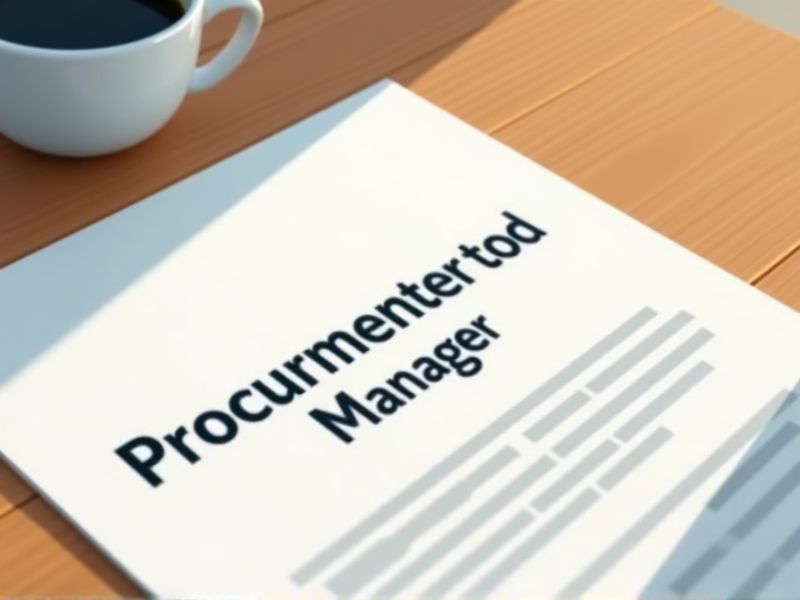
In the rapidly evolving world of supply chain and procurement, specialized knowledge is vital for maintaining competitive advantage. Certifications equip procurement managers with the skills necessary to navigate complex global markets, ensuring cost efficiency and strategic sourcing. These credentials also enhance credibility and open up opportunities for career advancement. Below are some key certifications that a procurement manager might find essential.
Certified Professional in Supply Management (CPSM)
The CPSM certification equips procurement managers with advanced skills in supply chain management, which enhances their decision-making capability. Having CPSM certification often correlates with higher salary potential and career advancement opportunities. Employers tend to trust CPSM-certified individuals more due to the rigorous standards the certification represents. The CPSM credential also keeps procurement managers updated on the latest industry trends and best practices, ensuring they remain competitive in a rapidly evolving field.
Certified Supply Chain Professional (CSCP)
The Certified Supply Chain Professional (CSCP) credential equips Procurement Managers with comprehensive knowledge of supply chain strategies, enhancing decision-making in sourcing and logistics. It fosters a deeper understanding of integrated supply chain functions, leading to improved efficiency and cost savings. With CSCP certification, Procurement Managers can better align supply chain processes with organizational goals, driving competitive advantage. Earning the CSCP credential often results in greater credibility and career advancement opportunities within the field.
Certified in Production and Inventory Management (CPIM)
Earning a CPIM certification provides Procurement Managers with a comprehensive understanding of production and inventory control, which enhances their ability to manage supply chain complexities effectively. The certification emphasizes techniques that optimize inventory levels, directly impacting cost-saving strategies. Acquiring this knowledge equips managers to make informed decisions that align procurement with production needs, improving overall operational efficiency. Enhanced skills in demand management and continuous improvement from CPIM certification can lead to more accurate forecasting, reducing the risk of stockouts or overstock situations.
Certified Public Procurement Officer (CPPO)
A Certified Public Procurement Officer (CPPO) credential significantly enhances a Procurement Manager's decision-making capabilities by providing a solid foundation in procurement laws and ethics. By achieving CPPO certification, a manager signals credibility and competence, fostering trust and effective communication with vendors and stakeholders. The CPPO credential expands a manager's toolkit with advanced techniques and strategies, leading to cost-effective purchasing decisions. Organizations benefit from hiring CPPO-certified managers through improved compliance with regulatory standards and increased operational efficiency.
Certified Professional Public Buyer (CPPB)
Obtaining a Certified Professional Public Buyer (CPPB) credential enhances a Procurement Manager's expertise in public procurement processes. This certification ensures the manager is well-versed in regulatory compliance and ethical purchasing practices, which reduces the risk of legal issues. Employers recognize CPPB certification as a benchmark for professional integrity and capability, often leading to career advancement opportunities. Proficiency in these areas results in more efficient procurement operations, optimizing resource allocation and cost savings for the organization.
Certified Strategic Sourcing Professional (CSSP)
Becoming a Certified Strategic Sourcing Professional equips a Procurement Manager with advanced insights into cost reduction strategies, directly affecting a company's profit margins. The certification enhances negotiation skills, leading to more favorable terms with suppliers and long-term savings. It provides expertise in risk management, reducing supply chain disruptions and ensuring stable business operations. Having CSSP credentials often boosts credibility and trust with stakeholders, facilitating smoother procurement processes.
Lean Six Sigma Green Belt Certification
Achieving Lean Six Sigma Green Belt Certification equips a Procurement Manager with tools to identify and eliminate waste in procurement processes, leading to cost savings. This certification enhances their ability to implement data-driven decision making, improving supplier performance and quality control. Through structured methodologies, a certified manager can streamline operations, reducing lead times and enhancing efficiency. Certification instills a culture of continuous improvement, vital for maintaining competitive advantage in procurement activities.
Project Management Professional (PMP)
Project Management Professional (PMP) certification enhances a procurement manager's ability to effectively oversee complex projects. It equips them with standardized methodologies that improve project delivery efficiency and resource management. PMP certification provides a robust framework for risk assessment, which is crucial in procurement to minimize operational disruptions. It also fosters better communication and collaboration skills, essential for negotiating and managing vendor relationships.
Certified Professional in Supplier Diversity (CPSD)
Having a Certified Professional in Supplier Diversity (CPSD) credential enhances a procurement manager's ability to drive effective supplier diversity programs, fostering innovation and opening new market opportunities. As organizations emphasize socially responsible practices, CPSD holders demonstrate a commitment to inclusive purchasing strategies, which can improve company reputation and stakeholder trust. Employers value CPSD-certified professionals for their expertise in navigating legal and regulatory requirements related to supplier diversity, reducing compliance risks. Procurement managers with CPSD can implement strategies that lead to more competitive pricing and improved supply chain resilience by engaging diverse suppliers.
Chartered Institute of Procurement & Supply (CIPS) Certification
Achieving Chartered Institute of Procurement & Supply (CIPS) Certification enhances a procurement manager's credibility by validating their knowledge and skills in procurement and supply chain management. This certification often leads to more significant career opportunities, as companies prioritize certified professionals for their expertise in strategic sourcing and supplier management. CIPS certification provides access to a global network of procurement professionals, facilitating the sharing of best practices and industry developments. Data reflects that organizations employing CIPS-certified professionals tend to experience improved efficiency and cost savings in their procurement processes.
Summary
When you, as a procurement manager, acquire certifications, your skills and knowledge in supply chain management are enhanced. This leads to improved negotiation strategies and cost savings for your organization. Consequently, you may witness increased job opportunities and career advancements. Certifications also boost your confidence and credibility within the industry.
